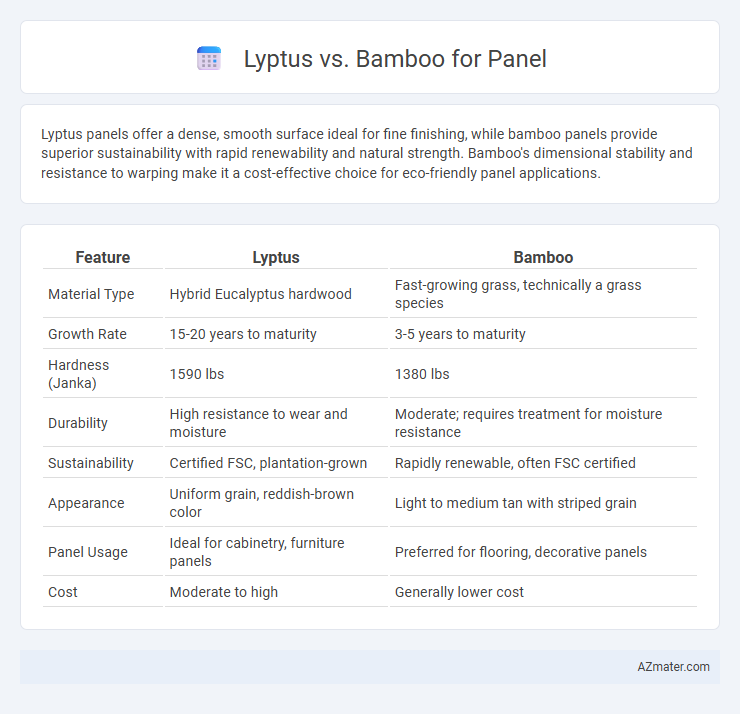Lyptus panels offer a dense, smooth surface ideal for fine finishing, while bamboo panels provide superior sustainability with rapid renewability and natural strength. Bamboo's dimensional stability and resistance to warping make it a cost-effective choice for eco-friendly panel applications.
Table of Comparison
| Feature | Lyptus | Bamboo |
|---|---|---|
| Material Type | Hybrid Eucalyptus hardwood | Fast-growing grass, technically a grass species |
| Growth Rate | 15-20 years to maturity | 3-5 years to maturity |
| Hardness (Janka) | 1590 lbs | 1380 lbs |
| Durability | High resistance to wear and moisture | Moderate; requires treatment for moisture resistance |
| Sustainability | Certified FSC, plantation-grown | Rapidly renewable, often FSC certified |
| Appearance | Uniform grain, reddish-brown color | Light to medium tan with striped grain |
| Panel Usage | Ideal for cabinetry, furniture panels | Preferred for flooring, decorative panels |
| Cost | Moderate to high | Generally lower cost |
Introduction to Lyptus and Bamboo Panels
Lyptus panels are engineered from hybrid Eucalyptus trees, offering a hard, durable surface with a fine, consistent grain ideal for furniture and cabinetry. Bamboo panels, derived from fast-growing bamboo grass, provide a sustainable and eco-friendly alternative with high tensile strength and natural resistance to moisture. Both materials are prized for their environmental benefits, but Lyptus delivers a hardwood aesthetic while bamboo emphasizes rapid renewability.
Botanical Origins and Growth Characteristics
Lyptus is a hybrid hardwood derived from Eucalyptus grandis and Eucalyptus urophylla, cultivated primarily in fast-growing plantations in Brazil, offering a dense and uniform grain ideal for panel production. Bamboo, a fast-growing grass from the Poaceae family, features a highly renewable structure with intricate fibrous strength, making it a sustainable alternative for panels. Both materials demonstrate rapid growth cycles, with Lyptus maturing in about 15 years and bamboo species capable of harvesting within 3 to 5 years, influencing their environmental and commercial viability.
Environmental Sustainability Comparison
Lyptus wood is sourced from fast-growing Eucalyptus trees farmed on sustainably managed plantations, promoting responsible forestry and carbon sequestration. Bamboo, as a highly renewable grass, regenerates rapidly without the need for replanting and requires minimal pesticides or fertilizers, reducing environmental impact. Both materials offer eco-friendly panel options, but bamboo's quicker growth cycle and lower resource demands generally make it a more sustainable choice in terms of land use efficiency and carbon footprint.
Strength and Durability Analysis
Lyptus panels offer high density and hardness, making them resistant to dents and scratches, which contributes to superior strength and durability in heavy-use environments. Bamboo panels exhibit exceptional tensile strength and flexibility, providing resilience against warping and cracking over time. Both materials outperform traditional softwoods, but Lyptus excels in load-bearing capacity while bamboo offers better natural elasticity and moisture resistance.
Workability and Fabrication Differences
Lyptus wood offers a harder, denser surface compared to bamboo, making it more resistant to dents and scratches during fabrication processes such as cutting and routing. Bamboo panels, while eco-friendly and lightweight, require sharper tools and slower feed rates to prevent splintering and damage due to their fibrous texture. The workability of Lyptus allows for more precise machining and smoother finishes, whereas bamboo demands careful handling and additional sanding to achieve comparable surface quality.
Aesthetic Qualities and Visual Appeal
Lyptus offers a warm, reddish-brown hue with a smooth, consistent grain that brings a rich, elegant appearance to panels, making it ideal for contemporary interiors. Bamboo panels showcase a unique, linear texture with natural variegation in color from light to golden tones, providing a modern yet organic look. Both materials enhance visual appeal, but Lyptus delivers a more uniform and refined aesthetic, while bamboo emphasizes a distinct, dynamic pattern often favored in eco-friendly designs.
Cost Comparison: Lyptus vs Bamboo Panels
Lyptus panels generally have a higher upfront cost compared to bamboo panels due to their slower growth rate and limited availability. Bamboo panels offer a more cost-effective option, benefiting from rapid renewability and widespread cultivation, which reduces material and processing expenses. For budget-sensitive projects, bamboo panels provide a sustainable alternative with lower initial investment while maintaining durability and aesthetic qualities.
Common Applications in Interior Design
Lyptus panels offer a durable and smooth surface ideal for cabinetry, furniture, and wall paneling in interior design due to their fine grain and stability. Bamboo panels are favored for flooring, decorative wall cladding, and ceiling treatments because of their eco-friendly properties and natural aesthetic appeal. Both materials provide sustainable alternatives with unique textures and finishes suitable for modern and minimalist interior applications.
Maintenance and Longevity Factors
Lyptus panels offer a dense, hardwood surface resistant to scratches and moisture, requiring minimal maintenance with periodic cleaning and occasional refinishing to preserve longevity. Bamboo panels, known for their rapid growth and eco-friendliness, demand regular sealing to prevent moisture damage and maintain structural integrity over time. Both materials provide durable solutions, but Lyptus generally outlasts bamboo due to its hardness and lower susceptibility to wear and environmental factors.
Final Recommendation: Choosing the Right Panel Material
Lyptus panels offer a sustainable hardwood option with excellent durability and a fine grain ideal for furniture and cabinetry, while bamboo panels provide superior environmental benefits through rapid renewal and exceptional strength-to-weight ratio. When prioritizing eco-friendliness and cost-effectiveness, bamboo emerges as the preferred choice due to its fast growth cycle and resilience. For projects demanding hardwood aesthetics and a smooth finish, Lyptus panels deliver a premium look with reliable performance.

Infographic: Lyptus vs Bamboo for Panel
 azmater.com
azmater.com